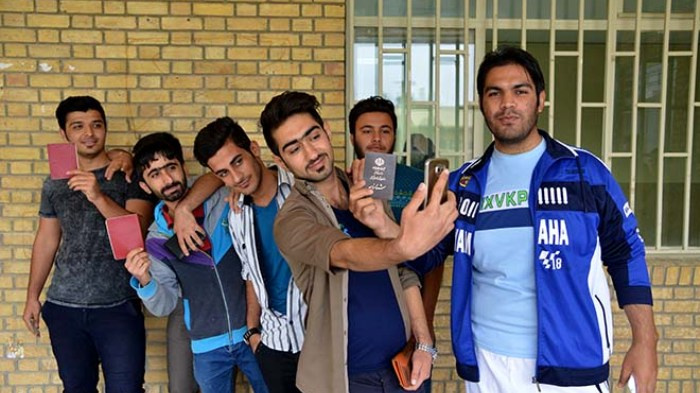Reform-Moderate Coalition Wins Majlis Majority

(Young voters in the western city of Ilam take selfie with their ID booklets in the voting center. Picture:Ali Jafari/Shabestan)
Reform-oriented, moderate and pro-administration candidates put the final seal on their coalition’s winning majority of the seats available in the tenth Iranian parliament as the official outcome of the runoff election suggests.
More than 170 aspirants competed for 68 undecided seats in the tenth parliament in the runoff. Thirty-seven hopefuls declared affiliation with the Principlist camp in the first round while the Reformists had submitted a 55-man list. Others remained independent.
In the first round of the election held in February, 209 constituencies across the country saw a 62 percent participation rate where 83 seats went to the Reformists and 75 were given to the Principlists; independents won 58 seat while 5 were left for religious minorities, according to ISNA.
Of the 68 seats available in the runoff, the Reformist-moderate coalition’s “List of Hope” has achieved 38 more seats just to emerge, as the real winners with sweeping 122 parliamentary seats, Khabar Online reported. Rival Principlists scarcely beat independents by collecting two more wins and stood second with 84 elected candidates. At least 16 women have gained the green to the Majlis, a record high in the history of the Islamic Republic.
The parliament is now coming out from under the dominion of the Principlists after three terms in a row. However, this highly anticipated victory comes against all the odds. In spite of sweeping pre-election disqualifications as well as the heretical case of Minoo Khaleghi after the election, the hard-won triumph materialized amid official media blackouts and monopolies. Throughout the way, Reformist campaigns were constantly sabotaged, with speeches either cancelled under pressure or stormed by the banally called 'spontaneous' individuals who often go unprosecuted.
The reemergence of Reformists in the decision-making arenas will inevitably bring back to mind the bitter memories of the sixth parliament, known for its competence but notorious for its failure to work with other parts of the establishment.
Mohammadreza Aref, the top MP-elect from Tehran, whose provincial visits were pivotal in the supplementary win, has now gained the upper hand in his bid to become the next Parliament Speaker. He will be in fraternal competition with Ali Larijani, whose dominant gene is that of a Principlist but has intuitively leant toward the ideals of moderates in the past years. While many observers believe a proclaimed Reformist Speaker will not be able to work with the establishment and has to spend great energy to resolve differences on every nuance, the Reformists have made it clear they will back Aref on his way to the chair. Sometimes criticized for his lack of charisma and dubbed as “the man who steps aside”, the tantalized Aref, too, seems not willing to let go of the chair, as he did in 2013 to help Rouhani into office.
The Reformist/moderate majority in the next parliament, the “Second Step” of the Reformist campaigns following the presidential race in 2013, could be instrumental in the now shaky implementation of the nuclear deal. It could also help Rouhani’s efforts to facilitate foreign investments, improve diplomatic and economic ties with the Global North, and boost the inflow of tourists, all subject to cynicism on the part of the Principlists on accounts of infiltration and cultural influence. If through such measures the administration manages to save the struggling economy by the end of the current Persian calendar year, it will be easily able to secure its chances of reelection. The Principlist minority is also strong enough to work as a control valve inside the parliament and lobby for its minimal demands.
Perhaps the most heated confrontation to be ever seen during the Tenth Parliament’s four-year term will occur at its very beginning. The Reformists have pledged to bring the five-year long deadlock concerning the fate of dissident leaders currently under house arrest to open sessions and resolve the issue in a matter of months. In his presidential campaign, Hassan Rouhani made similar promises but has failed to uphold them since then. The clarion call to settle old differences will most likely be met with deaf ears. If the two branches of the government work hand in hand to resolve the “sedition” standoff and bring about an air of national reconciliation, ‘the domestic deal’ could further weaken the Principlist camp and trigger reactions that are more radical during its implementation.

